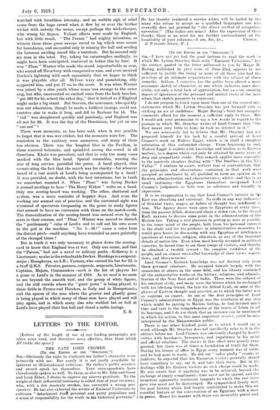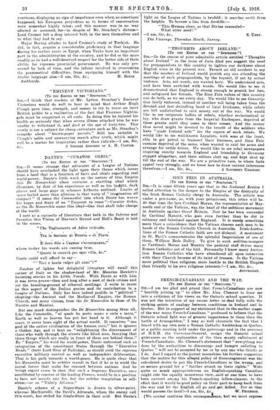[TO THE EDITOR OF THE " SPECTA702."I
fint,—I have not yet had the good fortune to read the work in which Mr. Lytton Strachey deals with " Eminent Victorians," but the extract quoted in the letter addressed to you by Major M. Baring, published in your issue of June 22nd, appears to me sufficient to justify the rising in arms of all those who had tha privilege of an intimate acquaintance with the subject of those remarks. Seldom, I conceive, has the public been offered a more erroneous sketch of character, or one which indicates more deci- sively, not only a total lack of appreciation, but an even amazing degree of ignorance of the personal and mental traits of the man whom that sketch purports to represent.
I do not propose to touch upon more than one of the several mis- statements which Mr. Lytton Strachey has put forward with so striking an air of confidence. Major Baring's brief but energetic comments afford for the moment a sufficient reply to these. But I would ask your permission to say a few words in regard to the passage in which Mr. Strachey writes of Lord Cromer that "the East meant very little to him; he took no interest in it."
We are necessarily led to believe that Mr. Strachey bad not prepared himself for his task by a careful perusal of Lord Cromer's work on Modern Egypt, which is in itself a complete refutation of this unfounded charge. From beginning to end, Modern Egypt is replete with knowledge and wisdom as to Eastern matters, to a degree which can only be attained by many years of deep and sympathetic study. This remark applies more especially to the masterly chapters dealing with " The Dwellers in the Nile Valley." I venture to assert, without fear of contradiction, that the principles and observations contained iu that work were accepted as conclusive by all qualified to form an opinion as to Eastern administration and characteristics; whilst—and this is no small testimony—the Egyptians themselves recognized Lord Cromer's judgments as both true in substance and friendly in expression.
It is no exaggeration to say that Lord Cromer's interest in t'sz. East was absorbing and universal. No trifle in any way indicative of Oriental views, usages, or habits of thought was indifferent to him. The Agency doors were open to Egyptians of every class, from the poorest fellah, distressed about a stolen cow, to the Grand Midi, anxious to discuss some point in the administration of the Moslem law. Taking a real pleasure in getting as near as passible to the inner mind of the people, both from his personal interest in the study and for his guidance in administrative measures, he would pass hours in discussing with any Egyptian of intelligence questions of taxation, religion, education, or any of the thousand details of native life. Even when most heavily occupied in political concerns, he found time to see these troops of visitors, and thereby he obtained a twofold reward : the complete confidence of the people, and an almost unrivalled knowledge of their views, aspira- tions, and idiosyncrasies.
Lord Cromer's Eastern knowledge was not derived only from these personal relations. He occupied himself largely with the researches of others in the same field, and his library contained
all the authoritative works on the history, religions, and adminis- tration of the Near East and of India. These were the subject of his constant study, and many were the letters which he exchanged
with his life-long friend, the late Sir Alfred Lyall, on some of the phases of Eastern thought and practice, as to which the latter was so supreme an expert. As one of the first principles of Lord Cromer's administration in Egypt was the avoidance of any step which might be jarring to Moslem feeling, he had devoted much time and care to the comprehension of the tenets of Islam in all its bearings, and I do not think that an instance can be mentioned in which his action, in this most important respect, could be mis- interpreted by the Mohammedan public.
There is one other kindred point as to which I would say a word, although Mr. Strachey does not specifically refer to it in the extract before me. Lord Cromer was constantly charged by hostile critics with harshness, brusquerie, and impatience in his social and official relations. The stories to this effect were grossly exag- gerated, but there was at times a foundation of truth for them. During his tenure of office in Egypt every moment was of value, and he had none to waste. He did not " suffer gladly " cranks or faddists; he expected that his European visitors generally should have something to say, say it, and take their leave. But in his dealings with his Eastern visitors no such charge could be made. He was aware that if anything was to be achieved, beyond the
exchange of empty compliments, time must not be spared, and the numerous apparently irrelevant tangents to which the real issue gave rise must not be discouraged. He sympathized keenly with the past history which had largely contributed to make this an essential feature of the conversation of an Egyptian with a man in power. Hence his manner with these was invariably genial and
tonneaus, displaying no sign of impatience even when, as sometimes happened, his European prejudices as to forms of conversation were somewhat highly tried; and this manner was in no way affected or assumed, for—in despite of Mr. Strachey's dictum— Lord Cromer felt a deep interest both in the men themselves and in what they had to say.
Major Baring alludes to Lord Cromer's study of Turkish. He did, in fact, acquire a considerable proficiency in that language during his earlier years in Egypt, when Turks bore an important part in the administration of the country, and he did so the more readily as he had a well-deserved respect for the better side of their ability for vigorous provincial government. He was only pre- vented by lack of time, and the labour involved in overcoming the grammatical difficulties, from equipping himself with the
Arabic language also.—I am, Sir, &c., H. Boris. Ambleside.











































 Previous page
Previous page